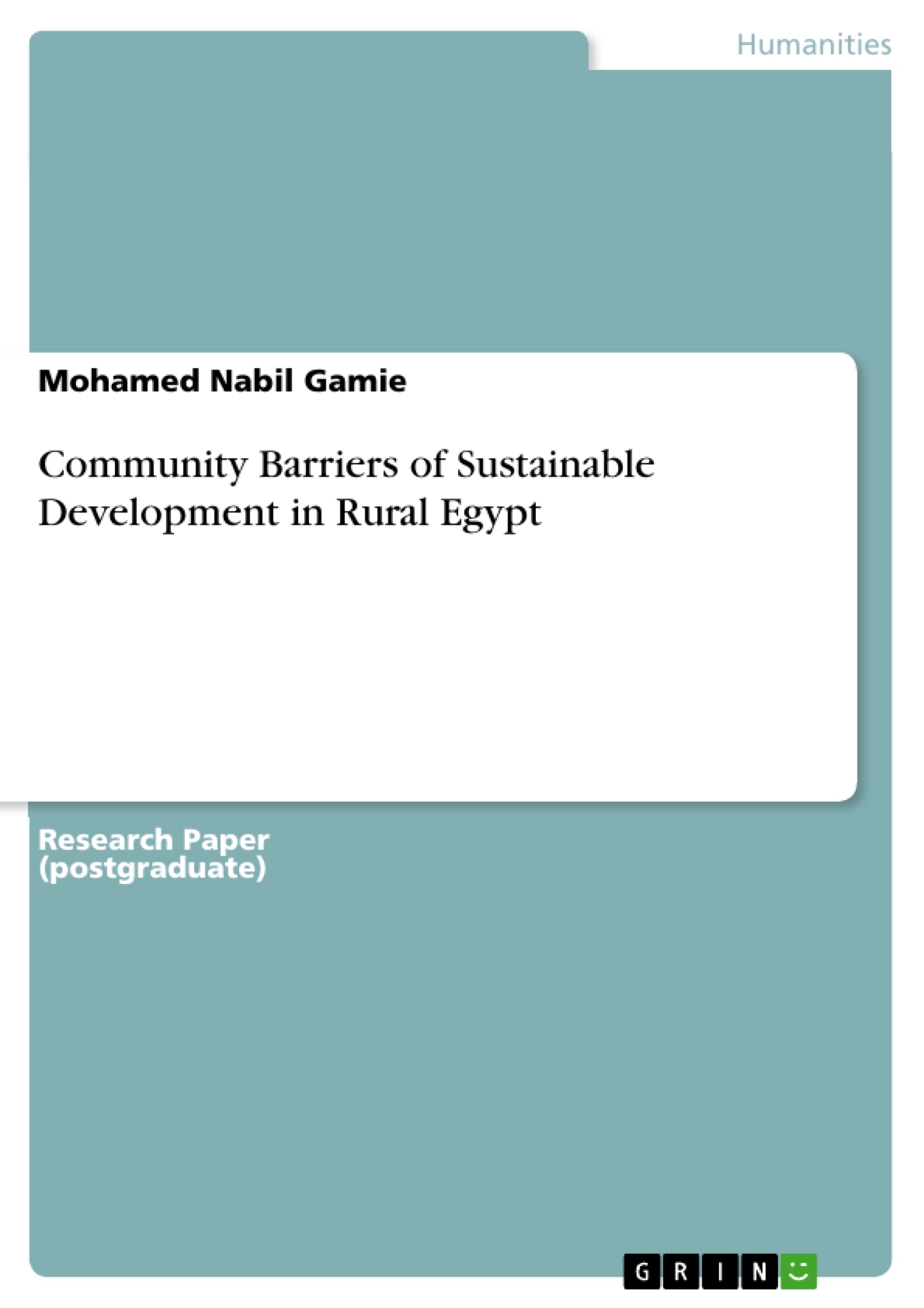The findings of a sample study of 257 villages in Egypt illustrate the salience of social and cultural variables in shaping community level of development. Existence and efficiency of organizations in Egypt ranked at the top of predictors with regard to direct causal effect on village development level. These organizations include the local governance unit, the social unit including a government directed community development association, village bank, schools, mosques and churches, agricultural cooperative, veterinary unit, youth and women associations (also governmentally directed), health units or village hospital, police unit (security organization), … etc. A very small indirect effect is also played by these organizations through their being a small part of a complex, titled here, “social engineering, or social technology.” Such complex includes, in addition to the above mentioned organizations, the degree of organizational coordination, proportion of population employed in village organizations and degree of organizational variety.
Inhaltsverzeichnis (Table of Contents)
- Introduction
- Rural Development in a Sustainable Perspective
- Historic and Macro-level Perspective of Rural Development in Egypt
- The study's General Hypothesis: Government Monopoly of Development
- Methodology
- The Sample
- Variables and Measurement
Zielsetzung und Themenschwerpunkte (Objectives and Key Themes)
The text aims to understand and evaluate the concepts of development and underdevelopment, particularly as they apply to less developed countries. It seeks to define rural community development and analyze different strategies implemented globally. The text also aims to pinpoint the causes of village underdevelopment in Egypt, considering historical, international, national, and local perspectives, and outline implications and strategies for Egyptian rural development.
- Defining sustainability and its various forms in development context.
- Examining the historical and macro-level factors contributing to rural underdevelopment in Egypt.
- Analyzing the concept of "government monopoly of development" as a barrier to sustainable development in rural Egypt.
- Investigating the role of community viability and self-reliance in achieving sustainable development.
- Evaluating the methodology and research findings of a comprehensive study on rural development in Egypt.
Zusammenfassung der Kapitel (Chapter Summaries)
- Introduction: This chapter introduces the concept of sustainability in development literature, highlighting the lack of consensus on its definition. It discusses the importance of understanding the multi-faceted nature of sustainability and its implications for development strategies.
- Rural Development in a Sustainable Perspective: This chapter defines rural development as a sustainable and planned process for transforming rural systems through a combination of production, service activities, and community participation. It emphasizes the importance of structural and functional elements for achieving sustainable rural development.
- Historic and Macro-level Perspective of Rural Development in Egypt: This chapter examines historical and macro-level factors contributing to village underdevelopment in Egypt, including deeply rooted historical conditions, international power structures, and national development policies. It highlights the complex interplay of factors that have shaped rural development in Egypt.
- The study's General Hypothesis: Government Monopoly of Development: This chapter presents the hypothesis that government monopoly of development, rooted in historical patterns of oppression and exploitation, has hindered community viability and self-reliance, leading to rural underdevelopment in Egypt.
- Methodology: This chapter details the methodology of a comprehensive study on rural development in Egypt, including the use of historical, statistical, secondary data, and survey methods. It discusses the selection of the sample, the variables measured, and the research design.
- The Sample: This chapter explains the selection process for the study sample, which consisted of 257 villages from four governorates in Egypt. The sample was chosen to represent a range of development levels and to allow for the analysis of independent variables influencing community development.
- Variables and Measurement: This chapter outlines the variables measured in the study, including the dependent variable of community development level and 24 independent variables. It describes the process of data collection and analysis, and how the variables were standardized and measured.
Schlüsselwörter (Keywords)
The key terms and concepts explored in this text include sustainable development, rural development, community development, government monopoly of development, community viability, self-reliance, underdevelopment, rural-urban development gap, historical perspectives, international influences, national policies, and research methodology.
Frequently Asked Questions
What are the main barriers to sustainable development in rural Egypt?
A key barrier identified is the "government monopoly of development," which hinders community self-reliance and viability due to historical patterns of central control.
How many villages were included in the Egyptian study?
The study analyzed a sample of 257 villages across four governorates in Egypt to represent various development levels.
Which local organizations are most influential for village development?
Local governance units, social units, village banks, schools, mosques, churches, and agricultural cooperatives are top predictors of development levels.
What is "social engineering" in the context of this study?
Social engineering (or social technology) refers to the complex interplay of organizational coordination, variety, and the proportion of population employed in village organizations.
What does "sustainability" mean for rural Egyptian communities?
Sustainability is viewed as a planned process transforming rural systems through production, service activities, and active community participation to ensure long-term viability.
How does history affect modern rural underdevelopment in Egypt?
Historical conditions of oppression and international power structures have shaped national policies that often created a rural-urban development gap.
- Quote paper
- Mohamed Nabil Gamie (Author), 2011, Community Barriers of Sustainable Development in Rural Egypt, Munich, GRIN Verlag, https://www.hausarbeiten.de/document/174332


